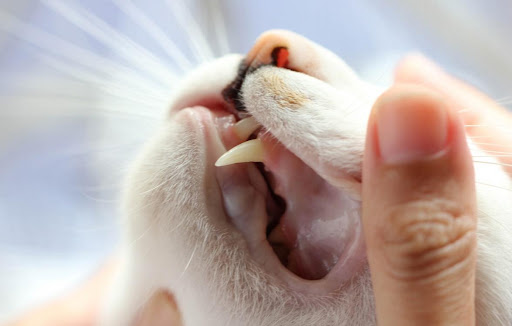Pet dental health is essential for your pet’s overall health and longevity. Most dogs and cats have some degree of dental disease as early as the age 3. If left untreated, these pets are at an increased risk for developing heart valve disease and kidney disease. Establishing good oral hygiene habits for your pet is essential in battling dental disease.
How can my pet get dental disease?
Dental disease starts with bacteria buildup in the mouth. These bacteria form a film over the teeth called plaque. As the bacteria die, they become calcified by the calcium in your pet’s saliva. The calcified plaque is called tartar, and it can eventually lead to gingivitis, which can lead to an infection in the root of the tooth. In the late stages of dental disease, the tissues around the tooth are destroyed, and the socket that holds the tooth in place erodes, causing a loose tooth.
Another common dental problem is broken teeth. Chewing on hard toys and treats like antlers and bones can damage your dog or cat’s teeth. A broken tooth can expose the tooth’s nerve, which is very painful for your pet. Additionally, the exposed nerve can become infected and cause even more problems for your pet, possibly resulting in a need for tooth extraction.
How do I know if my pet has a dental problem?
Regardless of any problems, your pet’s teeth should be checked at least once a year by your veterinarian for early signs of a problem and to keep your pet’s mouth healthy.
Have your pet’s teeth checked sooner if you observe any of the following problems
- Bad breath
- Broken or loose teeth
- Extra teeth or retained baby teeth
- Teeth that are discolored or covered in tartar
- Abnormal chewing, drooling, or dropping food from the mouth
- Reduced appetite or refusal to eat
- Pain in or around the mouth
- Bleeding from the mouth
- Swelling in the areas surrounding the mouth
Some pets become irritable when they have dental problems, and any changes in your pet’s behavior should prompt a call to our office.
Feline Juvenile Gingivitis
Feline Juvenile Gingivitis refers to inflammation of the gums that occurs following the eruption of a kitten’s permanent teeth (around 6-7 months). While it is not a comm problem, we see it most in kittens of oriental breeds.
Kittens suffering from juvenile gingivitis have redness, swelling, and inflammation of their gum tissue (gingiva). The cause of this disease is not known, but an exaggerated inflammatory response to tooth eruption, abnormal activity of immune cells, and viral exposure (FIV, FeLV, Calicivirus) have all been proposed as triggers.
Untreated juvenile gingivitis can lead to juvenile periodontitis. When this occurs, the immune system goes into overdrive, attacking the teeth and gums and causing bone loss.
To have any chance of halting and controlling these conditions, aggressive and early intervention is required. If left untreated they will rapidly progress to severe periodontal disease.
It is generally accepted that the susceptibility of patients to develop this condition (juvenile periodontitis) will often subside by two years of age.
If you suspect that your kitten is suffering from juvenile gingivitis, call us to set up an examination by one of our veterinarians.
Professional Pet Dental Care
Professional pet dental care involves an examination, X-rays, and teeth cleaning by a trained veterinarian. Our veterinarians are experienced in preventing, locating, and treating any issues that might go unnoticed by even the most dedicated pet owner. In addition to home care, it is best to get professional dental care for your pet throughout their life. You can see from our before and after pictures above the remarkable difference our professional pet dental services can make in the health of your pets’ teeth and gums!
Pet Dental Home Care
You can do a lot at home between professional dental care to help your pet maintain healthy teeth and gums.
- Brush their teeth. Brushing your pet’s teeth may seem extreme to some, but it is hugely beneficial for your pet. It would be best if you brushed your pet’s teeth twice a day. As a note, never use your toothpaste on your pet. You can find pet toothpaste such as Virbac C.E.T toothpaste. It comes in different pet flavors, such as poultry, seafood, and beef. Also, brushing a dog or cat’s teeth is not the same as brushing your teeth. Here is an excellent video from the AVMA on how to brush your pet’s teeth.
- Use tooth wipes. Tooth wipes are a faster and easier solution than brushing your pet’s teeth, although slightly less effective.
- Give them dental treats/chews. There are many treats and chew toys that you can buy for your pet that help remove plaque and improve dental health. If you are unsure what you should get for your pet, give us a call.
Final Words
We want your pet to live a long, healthy life, and we understand that maintaining your pet’s dental health is a critical part of that. Your pet’s health is important to us, so let us help you with this commitment. Call today to discuss your pet’s dental care needs and how we can help you!
Sincerely,
Dr. Jeff Hammond
Hammond Veterinary Hospital

